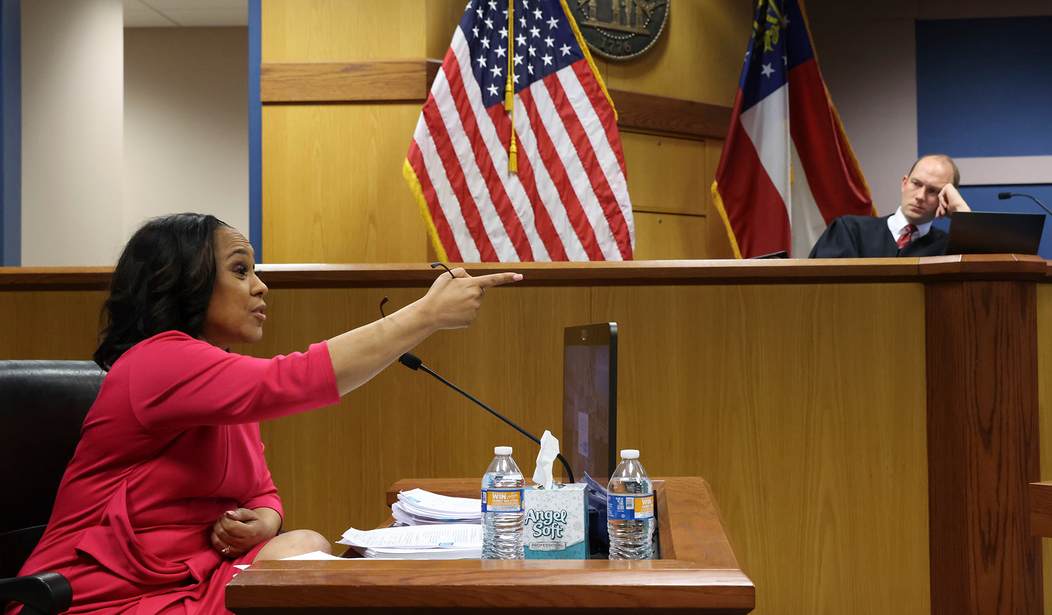The misconduct hearings on efforts to oust Fulton County DA Fani Willis from the Trump RICO case have come to a close. Both sides delivered final arguments Friday, each arguing where the bar should be set for the judge's looming disqualification decision.
The defense is arguing that the undisclosed affair between Willis and special prosecutor Nathan Wade, the Democrat district attorney's subordinate, constitutes a conflict of interest because she tapped her longtime lover to helm the prosecution. Meanwhile, the couple claims the affair started after she hired him in November 2021, but witness testimony from a former Willis staffer, Wade's cellphone data depicting late-night shenanigans, and texts sent by Wade's ex-divorce attorney say otherwise.
Trump defense attorney Steve Sadow said an "appearance of impropriety" is "enough" to disqualify her under Georgia law.
Trump’s lawyer Steven Sadow shows Adam Abbate how closing arguments are done 🔥 pic.twitter.com/csOWH41EJc
— Julia 🇺🇸 (@Jules31415) March 1, 2024
Deputy DA Adam Abbate, who's defending Willis, asserted that appearance alone is insufficient and that an "actual" conflict of interest has to be established, citing legal precedent. Although the examples Abbate cited relied on appearance, he indicated it was secondary to the court finding "actual conflict" in each disqualification case. Abbate called the disqualification efforts "a desperate attempt to remove a prosecutor from a case for absolutely no reason, other than harassment and embarrassment."
Incredibly painful
— Will Chamberlain (@willchamberlain) March 1, 2024
Abbate is just spewing word salad, he's not making sense, he's also just attacking witnesses left and right without a coherent theory of which testimony is believable and which isn't https://t.co/PpknpgxoGr
He said the defense's line of questioning intended to "impugn her character." There's "absolutely no evidence that the district attorney has benefited at all," Abbate asserted, contending that the burden of proving prosecutorial misconduct has not been met. "There's absolutely no evidence that the defendants [...] their due process rights, have been harmed in absolutely any way."
Recommended
Fani Willis lawyer Adam Abbate is so horrible and an embarrassment.
— 🕊 𝓐𝓷𝓷 𝓲𝓼 𝓡𝓲𝓰𝓱𝓽 🕊 𝐗𝐋𝐕 (@Ann_Lilyflower) March 1, 2024
🧐😬🤣🤣🤣🤦♀️
Watch 👇 pic.twitter.com/Zje7VEnR8u
Compared to Sadow's calm and composed demeanor, Abbate was, at times, a fumbling mess reciting case law. Willis, who was passing notes to Abbate and signaling with nods, "looked like she wanted to jump up and argue this case herself," per WaPo.
Look at the way veteran attorney Steve Sadow is looking at this idiot. pic.twitter.com/upLIhXgKv8
— Linda Traitz (@LindaTraitz) March 1, 2024
Abbate argued that prosecutors should not be held to the same standard as judges or juries when it comes to the appearance of impropriety. "The public prosecutor is necessarily a partisan in the case," Abbate said. If they were, "then there would never be a criminal prosecution because the state is always going to appear biased as it relates to getting justice for the victims," he stated.
Sadow raised rhetorical questions about who has the strongest motive to lie: "Who has the best motive of anyone to lie? They do. Who has the most at stake to lie? They do. Who wants to stay on this case, for whatever the financial reason may be? They do."
He also lambasted Willis for pulling out the race card at a black church in Atlanta where she claimed that Wade is under scrutiny simply because he's "a black man." Colloquially called "the church speech," which was part of a public conversation she had "with God," the Democrat DA's comments injecting race violated the state's professional rules of conduct, Sadow argued.
In the Georgia trial against Trump and defendants, Trumps attorney calls out DA #FaniWillis for her now infamous “church speech”#Trump #FultonCounty pic.twitter.com/bLdaBf5gEo
— Steve Gruber (@stevegrubershow) March 1, 2024
It was a "calculated" maneuver, Sadow said, to create "prejudice" in the minds of the jurors. "Can you think of anything more that would heighten public condemnation of the defendant than alleging that the defense counsel and the defendants were making their motion based on race and religion? That's as bad as it gets in Fulton County, with all due respect," Sadow stated.
"Virtually everybody in this community [...] has reviewed and analyzed that speech that she made in a premeditated way," attorney Craig Gillen for Trump co-defendant David Shafer added, accusing Willis of attempting to taint the jury pool.
Fani Willis had an affair, then appointed her lover to a job paid for by taxpayers to “get Trump.” Willis had the gall to speak at a church and say those questioning her hiring of Wade are “racist.” Race has nothing to do with corruption. The legal system is not an MSNBC show. pic.twitter.com/KmiUroWi8U
— Charles R Downs (@TheCharlesDowns) March 1, 2024
"If this court allows this kind of behavior to go on and allows DAs across the state by its order to engage in these kinds of activities, the entire public confidence in the system will be shot and the integrity of the system will be undermined," said Trump co-defendant Michael Roman's defense attorney John Merchant. "She put her boyfriend in the spot, paid him, and they reaped the benefits from it," Merchant stated, alleging that Willis "intentionally" devised a reward scheme. "She created the system..."
Since his hiring, Wade has pocketed more than $650,000 in taxpayer-funded paychecks for his work on the Trump case. While Wade is accused of splurging a hefty sum of his earnings on luxury travel with Willis, the prosecutorial pair insists she repaid Wade in other ways by covering costs here and there herself and reimbursing him with untraceable cash payments. Disputing that the finances were roughly balanced out, Merchant did the math: Willis enjoyed about $9,200 that cannot be accounted for.
...Again, McAfee is asking probative and tough questions including whether there should be some materiality requirement to avoid a stick of gum qualifying as a personal benefit.
— Jonathan Turley (@JonathanTurley) March 1, 2024
"What's the only way that they can save themselves? [...] 'Pay no attention to the records, pay no attention to the airlines, into the flights, and vacations and the cruises, I paid him back in cash,'" Gillen imitated Willis. "Show us your receipts. Where did you take cash out of the bank ever? 'I don't have any.' Well, show us the deposits that he had. 'Well never, we don't have any,'" Gillen continued. "'Just please trust us and believe us, because it's our only way out of the trap that they set for themselves.'"
"Prosecutors don't act like this [...] These people need to go," Gillen said of the shadiness surrounding the financial transactions.
Defense counsel Harry MacDougald, on behalf of ex-Justice Department official Jeffrey Clark, contended that Willis "cannot distinguish between her personal interests and her public duties as a prosecutor." By doing so, MacDougald said, Willis had placed an "irreparable stain" on the Trump case and made the Fulton County district attorney's office "a global laughingstock."
"Think of the message this would send if they are not disqualified. If this is tolerated, we will get more of it," MacDougald stated.
Closing argument from Jeff Clark's lawyer today in Fani Lovebirds case.
— Citizen Free Press (@CitizenFreePres) March 2, 2024
Harry MacDougald does an outstanding job here.pic.twitter.com/gwWx0LllZY
Trump co-defendant Robert Cheeley's lawyer Richard Rice said that the money Wade spent to woo Willis was the "personal interest" she had in the Trump case. The two "lived Robin Leach's 'Lifestyle of the Rich and Famous,' and they did this riding on the backs of the defendants in this case, funded by the taxpayers of Fulton County in the state of Georgia," Rice quipped.
...Judge McAfee just asked one of the most important questions on what is "personal" for the purposes of a disqualifying interest. Merchant noted that it is not defined and but "you know when you see it."
— Jonathan Turley (@JonathanTurley) March 1, 2024
Abbate said if Willis was taking advantage of public funds, she would have stayed at the Ritz-Carlton, among much more expensive hotels in the area, instead of the DoubleTree in Napa Valley. "I don't know that that's a lavish hotel," Abbate said.
"The allegation [she was] living the lifestyle of the rich and famous is an absolute joke," Abbate stated.
The only person this lawyer has dunked on is anyone who stays at the napa valley doubletree
— Comfortably Smug (@ComfortablySmug) March 1, 2024
Rice also bashed their excessive communications. According to AT&T records associated with Wade's phone number, over 2,000 voice calls and a little under 10,000 text messages were exchanged between Willis and Wade over an 11-month period in 2021.
Heat map of Fani Willis calls and texts with Nathan Wade, in 2021. Both testified under oath there was no relationship.
— Citizen Free Press (@CitizenFreePres) February 23, 2024
2,073 voice calls.
9,792 text messages.
Heavy concentration after hours.
7 days per week. pic.twitter.com/CQdzgqdz2v
"I don't even think lovestruck teenagers communicate that much," Rice taunted. "Teenagers have a name for those kind of calls and this kind of escapades," the attorney said, referring to the midnight visits Wade appears to have made to Willis's residence.
Now that Friday's final arguments are over, the judge presiding over the disqualification proceedings will decide on whether or not to disqualify Willis. However, Judge Scott McAfee will not rule on the matter immediately. At the conclusion of the three-hour hearing, McAfee announced that he would make a decision within two weeks. And so, we wait for the highly anticipated ruling.
"There are several legal issues to sort through, several factual determinations that I have to make," the judge told both parties. "Those are ones I can't make at this moment. And so I will be taking the time to make sure that I give this case full consideration."
If Judge McAfee isn’t satisfied that #FaniWillis has a conflict of interest or that she hasn’t perpetrated a fraud on the court, he can deny the motion to dismiss and DQ the DA
— Phil Holloway ✈️ (@PhilHollowayEsq) March 1, 2024
In which case the defense most likely can appeal, pretrial
As for Willis, the stakes are high. Her reputation is already ruined. She not only runs the risk of disqualification but could potentially face disbarment and perhaps perjury charges, if it can be proven she lied under oath about the affair's intricacies. It would be a sensational turn of events considering she charged Trump with making false statements and filing false documents.
Throughout the evidentiary hearings, Willis has been utterly humiliated by details of the couple's sordid sexcapades being publicly aired in the courtroom, exactly where she wants Trump to stand trial this summer. "You think I'm on trial?" a flustered Willis retorted on the witness stand. "These people are on trial for trying to steal an election in 2020. I'm not on trial, no matter how hard you try to put me on trial!" Willis went so far as to characterize the defense's interests as "contrary to democracy."
The FaniGate® scandal has produced a salacious sideshow to the prosecution of former President Donald Trump—with the latter now on the line. In addition to giving Willis the boot, the defense is hoping to dismiss the grand jury indictment against Trump and his 14 remaining co-defendants as "fatally defective" on grounds that the Willis-led prosecution was corrupted from its outset.
























Join the conversation as a VIP Member